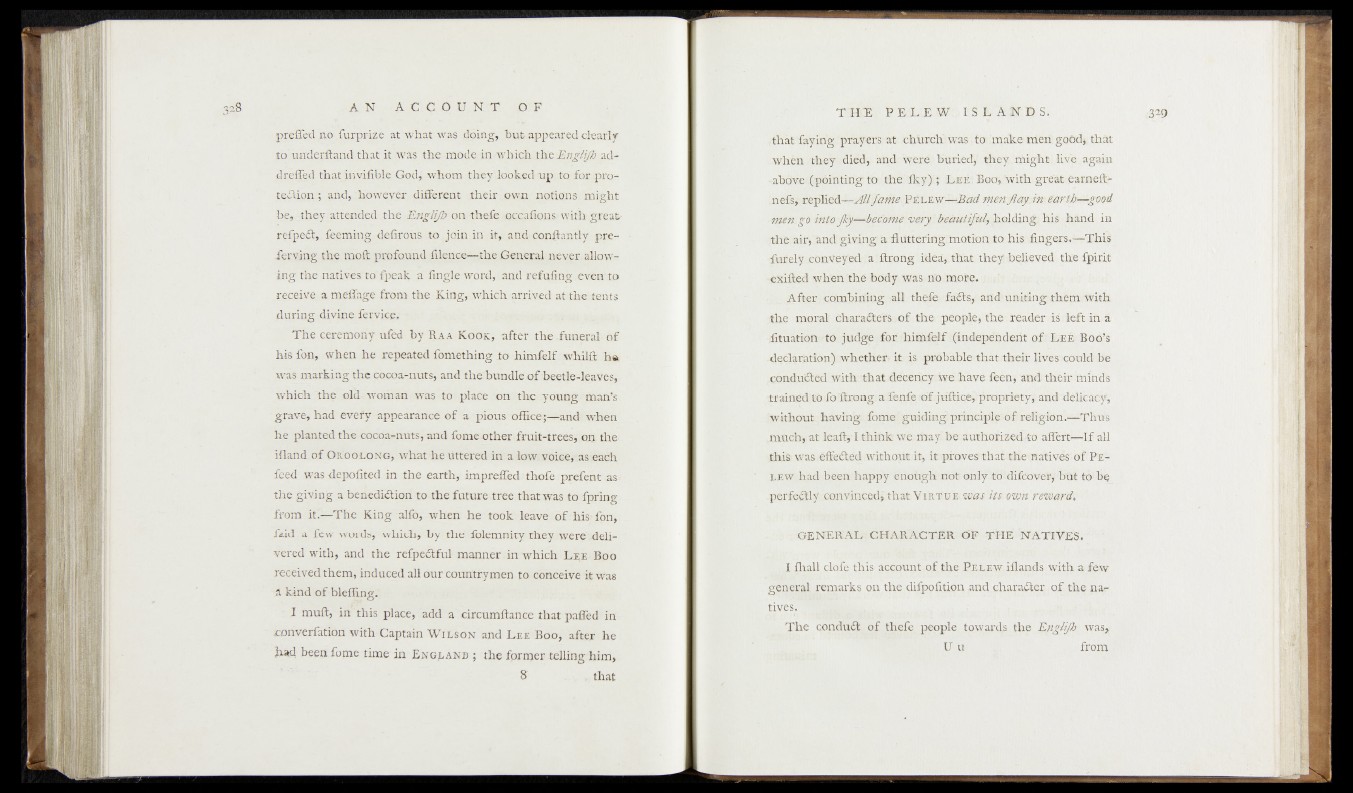
A N A C C O U N T O F
preffed no furprize at what was doing, but appeared clearly
to underftand that it was the mode in which theEngli/b a,d-
dreffed that invifible God, whom they looked up to for protection
; and, however different their own notions might
he, they attended the Engliflj on thefe occa lions. with great-
refpeCt, feeming defirous to join in it, and conffantly pre-
ierving the moft profound filence— the General never allowing
the natives" to" fpeak a tingle word, and refuting even to
receive a meffage from the King, which arrived at the: tents
during divine fervice, p
The ceremony ufed by R a a K o o k , after the funeral of
his fon, when he repeated fomething lo himfelf whilft h<*
■ w^s marking the cocoa-nuts, and theffundle of'beetle-leaves,
which the old. woman was to place on the young man’s':
grave, had every appearance of a pious office ;^-and when
he planted the cocoa-nuts, and fome other fruit-trees, q© the
ifland of O r o o u o n g , what he Uttered in alowiVoiGe^as each
Iced wasdepofited in the earth, impreffed thofe :prefent asi
the giving a benediction to the future tree that was to fpring
from iff—The King alfo, when he took leave of: his-fon,
faid a few words, which, by the folemnity they were',delivered
with, and the refpeCtful manner in which L^E- Boo
received them, induced all our countrymen to. conceive it was
â kind of blefling-
S J muff, in "this place, add a circumftance that paffed in
converfatibn with Captain W i l s o n and L e e Boo, after he
Aa.d been fome time in Englanb ; the fprnjer telling hiiu,
8 . , that
t h e - H R L E mm p h m t> Ü
-that fayiAgrprayers at church’;was r ter Imalte tried,gobdj that
when 'they died-,, and' werdi huriedjf thiey/jmjgbfej lave agajjn
-above-,(pointing* to the, iky )d L ee! BaQV'wffff greatearnclb-
.n efsy replied— fame PELEW-fftBotf mewft&y iv? tyrpft&gpod
the air,Vand givingjk ffuttenngHnQflou^tO.'hiaffl^@44^!—This
ffu'tfelyae&aVeyedi, a; ftrong ideas „that the$hb^lA§wd the fpirif
rexifted when thffb odywasho imolb.
After. -combining -alt thefe; ffaPsy arf(huni»‘i:igfth£m,with
ifhe iperal; charaCte'rsaof,thei people,-tho^-Mader usnkeft in a
is probabletthattheat- lirvesiebhldrbe
cbnd.uSled with. ‘that .decency we have feenj andi their in ihefs
trained,tofbfffroag:a ffepfe of juftiqe, propriety^ attdA&Hcaey',
^Without having fome£guiding! principle-of* religion .—ThuIjN
much, af leafty I think? we. ihayfb© authorize chitoaffert—If all
jfei^ WRSiiffisC^iwithc^it it, it proves'that-the •Aalivl#l>PP’E-
LEw had been happy enobgh not only tdldifcove'r/'btlt to-be
perfectly aanvinced, that: Yikt be was 'its vwn tewcird,
'©EMERAL: GllAltACTER OF THE <NATIVE*S.*
I fhall clofe this account of the Pelew iflapds with a few
general remarks on the difpofition and character-. of. the natives.
; The cbnduCt of thefe people towards the Engli/h wastf
U u . from I